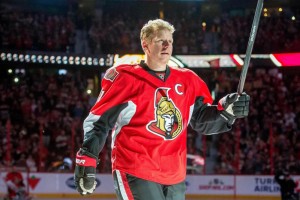Bryan Murray will have a lot to think about this Holiday Season. Murray has been battling colon cancer over the past two seasons all while maintaining his position as Ottawa Senators’ General Manager. Despite many expecting the 2014-2015 season to be his final one at the helm, Murray signed a one-year contract extension last season to keep him in charge until the end of the 2015-2016 season. With his contract expiring at the end of the season, Pierre Lebrun of TSN is reporting that Murray is taking the next month to consider his future with the club.
As many Ottawa fans will remember, Murray took charge as GM in 2007, shortly after coaching Ottawa to the Stanley Cup Finals. Over the past eight and a half years, Murray has been a polarizing figure among Ottawa’s fan base. While making some absolutely brilliant moves, Murray and his management team have also made some glaring errors. Regardless as to whether this season is Murray’s last or not, it is worth taking a look back at his time as Ottawa’s GM and assessing his legacy; the good the bad and the ugly.
The Good
![Erik Karlsson [photo: Amy Irvin]](https://s3951.pcdn.co/wp-content/uploads/2015/02/Erik-Karlsson-300x300.jpg)
While Murray’s record regarding player transactions is decidedly mixed, he deserves credit for two exceptionally savvy moves: trading David Rundblad and a 2nd round pick for center Kyle Turris and signing Clarke MacArthur as a free agent. Rundblad, who Murray acquired for the 16th overall pick in the 2010 draft from St. Louis, came into Ottawa with high expectations, after being names the Swedish Elite League’s Defenseman of the Year for 2010-11. Yet, despite his promise, he had trouble adapting to the NHL game and Murray dealt him in late 2011 to Phoenix for Kyle Turris. The rest is history. Rundbland has never managed to play more than 50 games in a season and currently plays for Chicago’s AHL affiliate. Alternatively, Turris has become Ottawa’s number one center and currently is on pace for another career season. A clear win for Bryan Murray.
Another clever move was signing Clarke MacArthur to a two-year, $6.5 million contract in 2013. MacArthur has subsequently scored 91 points over his two seasons in Ottawa and earned himself a five-year contract extension. A positive possession player, key penalty killer and solid top-six forward, MacArthur has provided excellent value for money ans assuming he fully recovers from his current concussion, will continue to be a valuable player as Ottawa fights for a playoff spot in 2016.
The Bad

Not all trades worked out as well as the Turris trade. While many fans will point to the Danny Heatley deal as a black mark on Murray’s record, Heatley’s subsequent struggles and Milan Michalek’s strong performance on Jason Spezza’s wing served to redeem the trade in fans’ eyes. The same cannot be said about the 2014 deal that sent Jason Spezza to Dallas. In return for star center Spezza, Ottawa received prospects Nick Paul, Alex Guptill and sophomore NHL winger Alex Chiasson, plus Dallas’ 2nd round pick in the 2015 draft. Chiasson has largely been what Ottawa expected, a serviceable bottom six winger, while Guptil, despite a promising college career, has largely failed to adapt to the professional game. Nick Paul, who played well for North Bay and Team Canada during his final junior season in 2014-15 may well redeem the trade for the Senators, but he has struggled this season to adapt to the professional game, failing to score in his first 23 games with Binghamton. Spezza meanwhile has continued to be an excellent possession player and solid offensive contributor for the Dallas Stars, posting better points per sixty minutes than Joe Thornton, Logan Couture or David Krejci. While Spezza was a year away from unrestricted free agency and reportedly requested a trade, receiving spare parts for a number one center is a clear failure. Furthermore, it isn’t clear that Murray and company tried to convince Spezza to stay, which would have been the smart course of action if a decent return couldn’t be had. Sure, Murray was in a difficult situation, but difficult situations are what he is paid to deal with, hence he can’t be let off the hook for this one.
Similarly, not all free agent signing were as successful as Clarke MacArthur. Really, the less we say about Alexei Kovalev’s two years in Ottawa the better, as Kovalev has not been shy about sharing his thoughts about his time in Ottawa. At least Murray managed to get a 7th round pick from Pittsburgh for him at the trade deadline, so that is something.
The Ugly

Daniel Alfredsson’s departure to Detroit has to stand as one of the ugliest moments in franchise history. The exact details of what happened have been endlessly rehashed in Ottawa media, but one thing is clear, management generally, and Bryan Murray specifically, have to share some of the blame. How much is not clear, and to what degree Senators’ owner Eugene Melnyk was directing operations is still unknown, but Murray is the public face of the team and he was the man in charge when all of this nastiness went down.
Beyond the Alfredsson debacle, many of the Ottawa Senators’ problems stem from the fact that they are unable to spend to the cap due to internal budget constraints. These limits are not Bryan Murray’s fault. However, the questionable ways that Murray has spent Eugene Melnyk’s money certainly has contributed to Ottawa’s financial woes. Particularly problematic has been long-term extensions given to players Ottawa drafted and developed. While a decent assessor of talent outside of the organization, Murray and the scouting staff seem to have a blind spot when it comes to their own players. Two contract extensions stand out as particularly egregious: Colin Greening and Jared Cowen. Greening singed a three-year, $7.95 million contract in 2013 that runs until 2017 with an AAV of $2.65 million. All this money for a player who scored one goal last year (by default) and currently only has 10 points in 23 AHL games. While Ottawa has tried to trade him, no team is willing to accept his massive contract, forcing Ottawa to put Greening on waivers. Although not a tremendous amount of money – Chicago is willing to put Bryan Bickell and his $4 million a year contract in the AHL – Greening’s contract limits Ottawa’s ability to keep depth forwards, as seen by Erik Condra’s departure for Tampa this past summer.
Even more galling for Senators’ fans is Jared Cowen’s contract, which pays him an average of $3.1 million a year until 2017. Anyone who watches Ottawa games’ with regularity will notice that not only is Cowen not worth the money, he is one of the weakest defenders on the ice. For example, see this tweet from TSN writer Travis Yost:
I don't know how many times I can say this but Cowen has zero spatial awareness. Nothing like I have ever seen before. Forget confidence.
— Travis Yost (@travisyost) December 17, 2015
And yet in many ways Ottawa dodged a bullet with Cowen, as multiple reports indicated that Murray had sought to extend his contract for the maximum of 7 years. What this optimistic assessment of Cowen’s ability was based on is unclear. It certainly wasn’t his level of play, which despite a strong rookie season, never was strong enough to warrant sure-fire status and a long-term deal. Furthermore, despite it being clear both on the ice and the stats sheet that Cowen was not worth his money, Murray has resolutely defended the player; even when Cowen openly told the press he ignores what Murray says. Despite all these incidents Cowen still remains part of the Ottawa Senators. While there may not be a trade market for him, buying Cowen out certainly is an option, one Ottawa has so far refused to exercise. As a consequence, Ottawa’s defense corps beyond Karlsson and Methot has struggled mightily this year. Especially when one considers that with the money Ottawa is paying Cowen, they could have signed talented top four NHL defenders Cody Franson or Christian Ehrhoff, Murray has to take substantial blame for the ongoing Cowen debacle.
Bryan Murray and the Senators
Obviously I have not covered everything that Bryan Murray has done in his almost decade in charge of the team. In particular I have not mentioned Ottawa’s revolving door of coaches or the Bobby Ryan trade and subsequent extension. Both will be the subject of future posts. Overall though, Bryan Murray has built a team on a tight budget that is only a few moves away from contending in a relatively weak Eastern Conference. However, Murray has also seemed unwilling (or unable?) to make the final few moves to put Ottawa over the hump. Yet, he will leave the next GM of the team in good stead. With elite prospects Colin White and Thomas Chabot playing well, plus a strong forward corps of young players, Ottawa’s future GM will have a lot to work with. For that Murray deserves a lot of credit. However, If Ottawa fails to capitalize on the window of opportunity this generation of players has, Murray also should take a substantial portion of the blame for failing to recognize and seize the opportunity. Bryan Murray’s legacy? Right now it is probably too soon to tell.